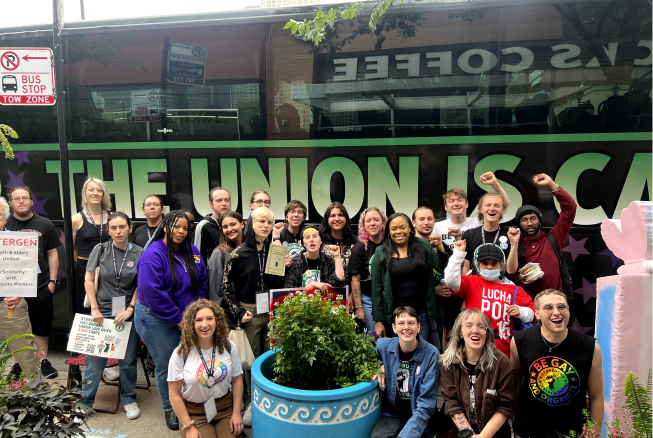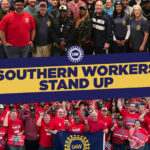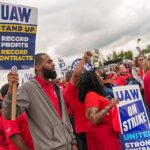Malik Miah
Posted June 18, 2024

THE U.S. SUPREME Court sided with Starbucks in a June 13 decision that will make it harder for labor advocates to win court injunctions against employers engaged in anti-labor practices, in this case firing union organizers.
The Supreme Court, an unelected body appointed for life and controlled by hard right extremists, ruled for the employing class against workers at the large coffee brewing company.
In an 8-1 vote, with two of three “liberals” siding with the ultra-rightists, the court upheld Starbuck’s firing of seven union organizers at a Starbucks store in Memphis, Tennessee.
Workers United president Lynne Fox responded in a statement posted on the union’s website.
Implications
The implications go far beyond the coffee store giant. It makes it easier for all employers to bust unions across the country, including at manufactures such as those in the auto industry.
As reported by the Los Angeles Times and other news media outlets, the Court ruling “limited the power of judges and the National Labor Relations Board (NLRB).
“In doing so, the justices set a higher legal standard to prevent judges from deferring to the labor board in pending disputes.”
Justice Clarence Thomas, known for his hostility toward unions and his pro-big business agenda, said, “A preliminary injunction is an ‘extraordinary’ equitable remedy that is never awarded as a right.”
Lynne Fox said the unionizing efforts will not be deterred:
“Regardless of large corporations’ machinations at the Supreme Court, workers are continuing to organize. Just last week, workers at 20 Starbucks stores filed petitions to join Starbucks Workers United. And there are nearly 450 union Starbucks stores across the country. Workers momentum is unstoppable, and they will not let the Supreme Court slow them down.”
AFL-CIO president Liz Shuler said the Court had “sided with corporate power over Starbucks baristas today in a direct attack on the fundamental freedom to organize a union on the job.
“This decision sets a higher threshold for courts to reinstate workers who have been unfairly fired. In a system that is already stacked against workers, this will make it even harder for them to get back their jobs.”
Background
Starbucks owners have presented themselves to the public as supporters of liberal causes. The reality is that Starbucks has a notorious anti-union management, would rather fire workers speaking up for their rights, and has closed stores and reopened with new ones to keep the union out.
The coffee company said it took the Memphis case, known as Starbucks vs. Mckinney, to the high court seeking to “level the playing field” in what the company called a “union-friendly” legal standard that allowed judges to intervene early and to rule against the employers.
Starbucks lawyer Lisa Blatt said that such injunctions practically amount to “the whole ballgame.”
This is false. Most rulings historically have been slow and deliberate and rarely gave labor what it deserved. The anti-labor bent of the Supreme Court gave Starbucks management an expectation of a favorable ruling to stop court injunctions against employers.
The NLRB says these temporary injunctions are needed to protect workers who were fired in violation of the labor laws. But the companies say they should not be forced to rehire employees who break their work rules.
In February 2022, Starbucks fired seven baristas in Memphis who were seeking to organize a union. The company said the dismissals arose from “significant violations” of their safety and security policies. They said the employees had remained in the store after closing hours and invited local media to interview them.
Starbucks Workers United filed a complaint with the NLRB, contending the workers were fired in retaliation for their organizing efforts. Kathleen McKinney, an NLRB regional director, petitioned a federal judge to issue an order protecting the workers while the board considered their complaint.
U.S. District Judge Sheryl Lipman agreed there was “reasonable cause” to believe the workers had a valid claim, and she ordered Starbucks to rehire the seven employees.
Starbucks lawyers argued that in other non-labor cases, judges rarely issue such temporary injunctions and do so only if they are convinced the suing parties are likely to win in the end.
The bottom line: workers can only rely on their own power to defeat employers like Starbucks.



Leave a Reply